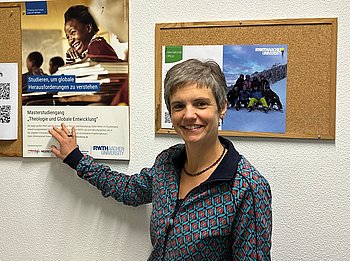Using practical experience to inform science and academia
Global development in the classroom

Sandra Lassak
I took part in a placement in Peru from 2012 to 2019 as a co-worker for Swiss organisation Comundo. I worked in the highlands for two years before moving to Lima to take on the role of Comundo country director for Peru, where I also worked at an ecumenical facility for theological adult education. There, I taught evening classes to adults with a range of different beliefs and confessions who, over the course of three years, worked towards obtaining a professional qualification in theology. The students came from both ends of the socio-economic spectrum and varied greatly in their levels of knowledge and their experiences. It was a challenge to reconcile these realities under one thological banner. We aimed to convey the academic discourse and concepts of the field in such a way as to highlight their relevance for the students' everyday lives - while also empowering them to cultivate critical protagonism. My teaching focus was on gender studies and feminist theology. It was important to us to act as an interface between the active practices of diverse groups of women and feminist movements while also leaving room for academic analysis and refelction. For example, we also worked with universities and organised joint events.
Theology and Global Development
Using specific situations and practical experiences as a basis for academic reflection and analysis is also a key feature of the master’s degree program “Theology and Global Development,” which I have helped teach since 2020. The program was established in 2017 as a collaborative project between the Institute for Catholic Theology at RWTH Aachen University and faith-based organisations Missio and Misereor. After returning from Peru, I took a position at Misereor in Aachen in 2020 as an expert for fundamental theological questions. Part of the job includes assisting with the “Theology and Global Development” degree program. This required me to have a completed a doctoral degree and have experience with teaching development policy. The degree program may be based at the Institute for Catholic Theology, but it focuses heavily on interdisciplinary collaboration. It aims to combine teaching, research and practice.
Theology and Global Development
Using specific situations and practical experiences as a basis for academic reflection and analysis is also a key feature of the master’s degree program “Theology and Global Development,” which I have helped teach since 2020. The program was established in 2017 as a collaborative project between the Institute for Catholic Theology at RWTH Aachen University and faith-based organisations Missio and Misereor. After returning from Peru, I took a position at Misereor in Aachen in 2020 as an expert for fundamental theological questions. Part of the job includes assisting with the “Theology and Global Development” degree program. This required me to have a completed a doctoral degree and have experience with teaching development policy. The degree program may be based at the Institute for Catholic Theology, but it focuses heavily on interdisciplinary collaboration. It aims to combine teaching, research and practice.
The Potential of Development Service
My own experiences and the current discussions surrounding critical scholarly debate motivated me to integrate these perspectives into the degree program. By incorporating experiences and discusiions from the Global South into our local academic communities at home, we open up room for other ways of thinking and have the potential to bring about real chance. For this is precisely where the potential of development policy experience lies - in using active practice to think critically about science.
Über die Autorin
Sandra Lassak is a lecturer at RWTH Aachen University, where she teaches in the master's degree program “Theology and Global Development”.
